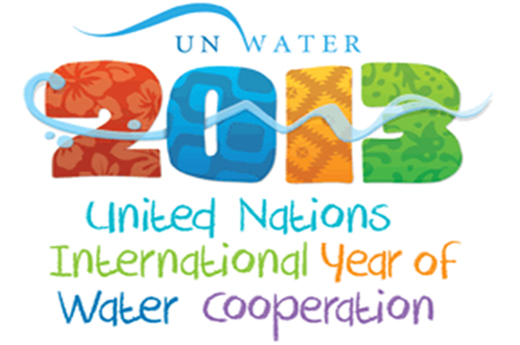In December 2010, the United Nations General Assembly declared 2013 as the United Nations International Year of Water Cooperation (Resolution A/RES/65/154). In reflection of this declaration, the 2013 World Water Day, which will take place on 22 March 2013, also will be dedicated to water cooperation. Therefore, UN-Water has called upon UNESCO to lead the 2013 United Nations International Year on Water Cooperation, in particular because of the Organization’s unique multidisciplinary approach which blends the natural and social sciences, education, culture and communication. Given the intrinsic nature of water as a transversal and universal element, the United Nations International Year on Water Cooperation naturally would embrace and touch upon all these aspects.
The objective of this International Year is to raise awareness, both on the potential for increased cooperation, and on the challenges facing water management in light of the increase in demand for water access, allocation and services. The Year will highlight the history of successful water cooperation initiatives, as well as identify burning issues on water education, water diplomacy, transboundary water management, financing cooperation, national/international legal frameworks, and the linkages with the Millennium Development Goals. It also will provide an opportunity to capitalize on the momentum created at the United Nations Conference on Sustainable Development (Rio+20), and to support the formulation of new objectives that will contribute towards developing water resources that are truly sustainable.
Celebrations throughout the Year will include featured events at UNESCO Headquarters in Paris, as well as many other events organized by various stakeholders around the world. Such events will seek to promote actions at all levels in relevant areas including education, culture, gender, the sciences, conflict prevention and resolution, as well as ethics, among others.
Secretary-General's Message on World Water Day, 22 March, 2013
Water holds the key to sustainable development. We need it for health, food security and economic progress. Yet, each year brings new pressures. One in three people already lives in a country with moderate to high water stress, and by 2030 nearly half the global population could be facing water scarcity, with demand outstripping supply by 40 per cent. Competition is growing among farmers and herders; industry and agriculture; town and country; upstream and downstream; and across borders. Climate change and the needs of populations growing in size and prosperity mean we must work together to protect and manage this fragile, finite resource.
This is the International Year of Water Cooperation, and World Water Day 2013 is dedicated to highlighting the joint efforts necessary to ensuring a fair share for people and planet. The United Nations system, through UN-Water and its 30 UN members and 25 international partners, is fostering collaboration from the global level to the grassroots. For example, the UN Development Programme’s Shared Waters Partnership is supporting political agreement on shared waters, such as in the Nile Basin. UNESCO is supporting the equitable management of transboundary water resources to avoid conflict, while the UN Economic Commission for Europe’s Convention on the Protection and Use of Transboundary Watercourses and International Lakes will soon be available to all UN Member States. I urge countries outside the UNECE region to join the Convention and further develop it.
Agriculture is by far the largest user of freshwater, and there is growing urgency to reconcile its demands with the needs of domestic and industrial uses, especially energy production. Climate change also presents a growing threat to agricultural productivity and food security. My Zero Hunger Challenge promotes sustainable agriculture by sharing best practices and harnessing the most appropriate technologies so small farmers and industrial giants alike can get more crop per drop.
No message on water should pass without mentioning sanitation. While the Millennium Development Goal target for providing access to improved water sources has been reached, we are woefully short on sanitation. Some 2.5 billion people lack access to the dignity and health afforded by access to a toilet and protection from untreated waste. We count the cost in lives -- 4,500 young children a day – and economic productivity. Yet we know that every dollar spent on sanitation can bring a five-fold return. That is why the Deputy Secretary-General has this week launched a global call to action to accelerate work towards the MDG on sanitation. Investment in sanitation is a down-payment on a sustainable future.
There are little more than 1,000 days left before the MDG deadline, but with renewed effort we can finish the job started at the beginning of the Millennium. But 2015 is not a finishing line, merely a milestone in a long and challenging journey. As we develop the post-2015 development agenda, our aim is to eradicate extreme poverty and hunger, and to create an equitable world of opportunity for all. To do that, we need to give equal consideration to the environmental dimension of sustainable development. We cannot prosper without clean, plentiful freshwater. On this World Water Day, I appeal for heightened cooperation. Water is a common resource. Let us use it more intelligently and waste less so all get a fair share.
Ban Ki-moon








